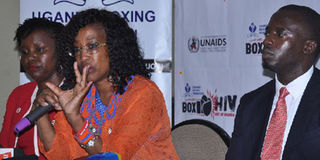Test for HIV, seek proper treatment, boxers urged

Beware. UNAIDS country director Dr. Karusa Kiragu (centre) at the campaign launch at Kati Kati. Looking on is UBF president Moses Muhangi (Right) and Dr Sheila Birungi of the Aids Information Centre. Photo by Abdul-nasser Ssemugabi
What you need to know:
- Effective tomorrow, till December 5, Nsubuga, Dr Lydia Mungherera of Mamas Club, among other facilitators will, in several workshops, sensitise opinion leaders in boxing—coaches, club owners, administrators, referees and judges, games teachers and sports tutors—about HIV/Aids, its risks and how they can be mimimised.
Kampala. Launching the “Box HIV/ AIDS Out of Uganda” campaign yesterday, renowned HIV/Aids combatants urged boxers to be bold and test to know their HIV status, and if they are infected to take the proper medication.
The campaign, a concerted effort by UNAIDS, the Uganda Boxing Federation, the Infectious Diseases Institute, Aids Information Centre and the Uganda Aids Commission, aims to create awareness and sensitise the boxing fraternity on the dangers of HIV and give preventive and curative alternatives like abstinence, condom use, and proper medication, among others, towards the lofty target of ending the scourge by 2030.
UNAIDS country director Dr. Karusa Kiragu said while the young people are more vulnerable to HIV infection, it is the adults [aged 45-49] the most infected, who mostly infect the young ones.
“So we need to have these honest conversations and let the young ones know these risks,” Dr Kiragu told the press at Kati Kati Restaurant in Lugogo. “And don’t test once, test at least once every year. And if you are positive take proper drugs, don’t become the virally unsuppressed.”
Using a boxing analogy, Dr Andrew Kambugu of the Infectious Diseases Institute said: this is boxing duel with Uganda in one corner and HIV/Aids in another. “We have come a long way, we are in the 11th round of this 12-round bout, but in sport, it’s not over till it’s over.”
Statistically, Dr Kambugu quoted the 2016–2017 Uganda Population-based HIV Impact Assessment report that 60 per cent of the people living with HIV have a suppressed viral load. Literally, viral load refers to the amount of virus in the blood. Hence, viral suppression is reducing the function and replication of a virus. So, antiretroviral medication, experts say, is considered highly successful if it reduces a person’s viral load to undetectable levels.
Moses Nsubuga, a former renowned radio presenter and singer, said he has lived with HIV since 1994, but due to regular medication, his viral load is now undetectable and his partner for the last 15 years is negative. “If you take your medication well, you reach a point when you can no longer pass on the virus,” he said.
But earlier on he warned: please do not get infected because you do not know what we went through, but if you get infected please do not commit suicide…there’s a way.
Effective tomorrow, till December 5, Nsubuga, Dr Lydia Mungherera of Mamas Club, among other facilitators will, in several workshops, sensitise opinion leaders in boxing—coaches, club owners, administrators, referees and judges, games teachers and sports tutors—about HIV/Aids, its risks and how they can be mimimised.
Thirty five punching bags, labeled with UNAIDS and UBF logos, will be given to 35 boxing clubs as part of the campaign.
How do you get tested for HIV?
Stay vigilant. A HIV test involves a sampling of blood or saliva to check for signs of the infection.
You can get a free finger prick blood test in a clinic, which can provide a positive/negative result in minutes.
Alternatively you can buy a home testing kit from a pharmacy.




